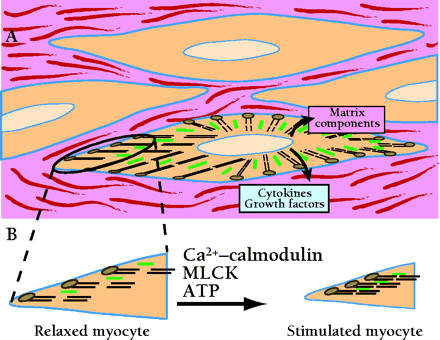
- Institution: Stanford Univ Med Ctr Lane Med Lib/Periodical Dept/Rm L109
- Sign In as Member / Individual
Secretory Functions of Smooth Muscle: Cytokines and Growth Factors

Smooth muscle cells in vivo are embedded in an extracellular matrix consisting of proteins and glycosaminoglycans secreted by smooth muscle cells and fibroblasts. A. Contractile proteins actin (thin filaments; black) and myosin (thick filaments; green) are abundantly expressed and interact to produce force. Under both physiological and pathological conditions, smooth muscle cells also secrete many proteins that probably act as autocrine and paracrine signals. In inflammatory states such as atherosclerosis and asthma, smooth muscle cells are capable of secreting a wide range of cytokines and growth factors into the extracellular space that modify contraction, promote muscle cell growth, and elicit further secretion of signaling proteins. B. Contractility of smooth muscle depends on cellular Ca2+ influx, which activates the myosin light chain kinase (MLCK) reaction that promotes the myosin–actin interactions that underlie contraction. A specific phosphatase (not shown) promotes relaxation of contracted myocytes. See text for details.


